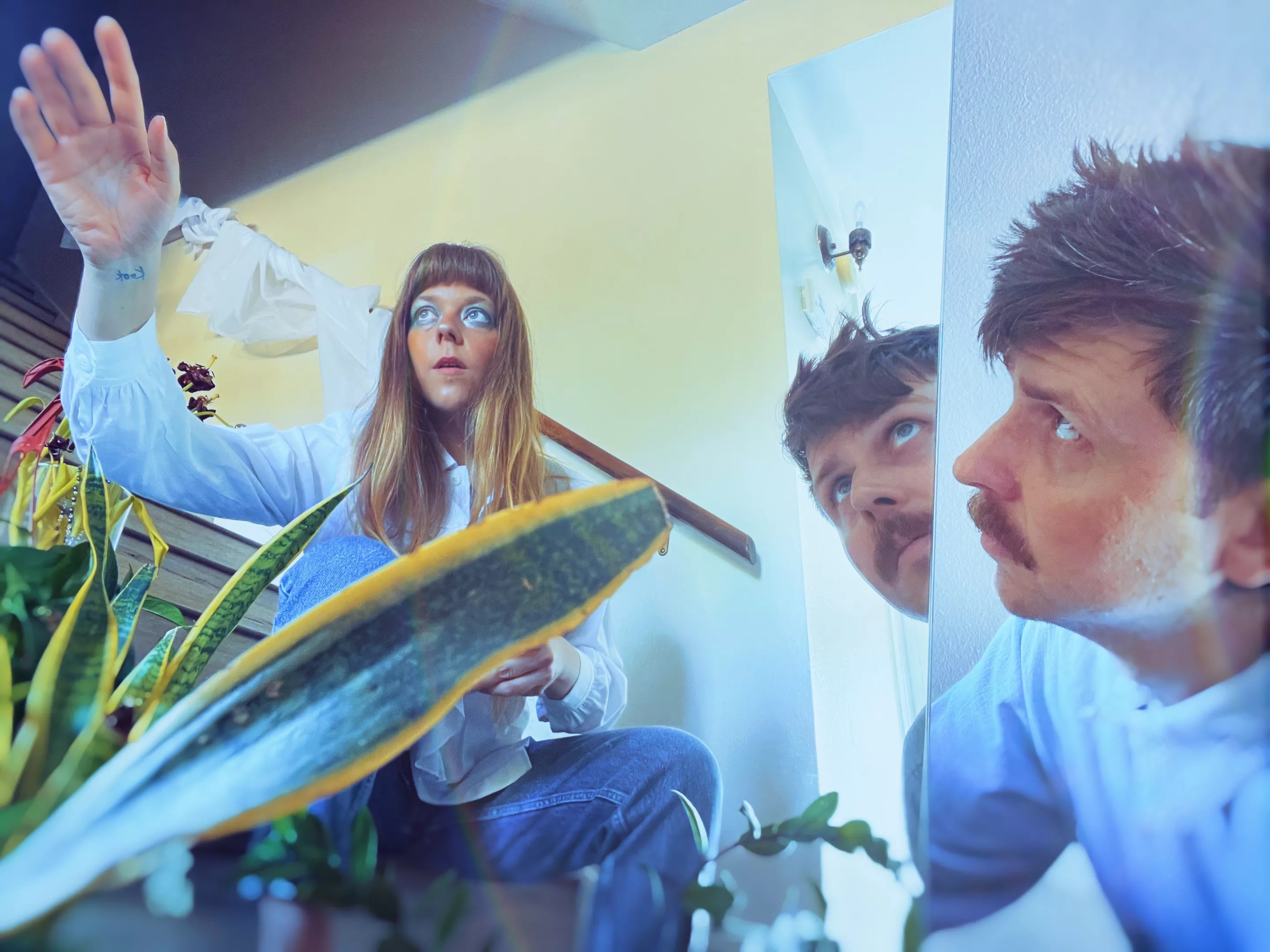
Maddie Miller

Audio By Carbonatix
Bogan Via haven’t released an album since 2018’s “Hard To Kill.” Heck, there hasn’t even been a new single since 2020.
That doesn’t mean, however, they haven’t remained steadily busy.
“We’re making music all the time,” Bret Bender says. “I lock myself up in my office most nights of the week regardless. And I’ll probably be doing that till the day I die.”
Bender says the duo, which also includes Maddie Miller, has”10 times the amount of material that we’ve ever released.” So, why the extended delays between new projects?
“I hate this idea of productivity,” Miller says. “It’s just such an American ideal. I resent the idea of having to just work constantly and prove that you’re creating constantly. It’s something I really struggle with. Especially because Brett always does want to create constantly.”
It may also be the sheer demands that come once the recording is actually over.
“It’s a matter of getting the energy together and feeling like we’re ready to go for it again,” Bender says. “It takes a lot to decide you want to promote an album.”
But, like so many other artists in recent years, plans and strategies have shifted, and Bogan Via have been trying to make music their full-time gig as of late. It’s a change made even more complicated because, despite the band’s infrequent release schedule, Bender grapples with patience.
“It’s hard for me to let things come naturally,” Bender says. “I’m always kind of like go, go, go, go, go.” He adds that he’s often the “impatient, anxious artist who just wants to record it, master it, and then put it on Spotify the next day.”
Luckily, there are some ways to know that new music is finally ready to enter the world, and that’s going to be essential for Bogan Via going forward.
“It’s something you just feel compelled to share, I guess,” Bender says. “Like, I feel like we actually did something good.”

Bogan Via is composed of Maddie Miller and Bret Bender.
Maddie Miller
That very sentiment is why the duo are finally releasing a new album, “Everything’s OK,” due out later this fall. For Bender, the six-track effort is the culmination of a grander personal journey, not just on learning to focus more, or landing some sweet new job, but a decidedly novel outlook on life.
“I definitely think the reason for making music shifted for me,” he says. “I had a little bit of a spiritual awakening starting through the pandemic.”
Bender was able to explore certain subcultures and practices that he’d always been curious about but never fully approached.
“I’ve always just been a curious person – those curiosities went from the kiddie portion of the water park to every portion of my life – much to Maddie’s chagrin,” said Bender.
He added, “I happened to get into aliens and the esoteric. You start going into your shadows and your past and realizing, ‘Oh, shoot, maybe this is why I’m this way. Or, maybe this is why I do things like this.’ Just trying to heal personally on those deeper levels. Plus, trying to come through and wanting to make music to provide that for other people and communicate that story.”
Miller, on the other hand, thinks Bender’s new interests have been a net positive.
“He’s always been the lyricist primarily,” she says. “And now he really writes about his spiritual journey and, honestly, I think it’s amazing and he’s definitely gotten me into some things.”
If anything, Bender’s own journeys have inspired Miller to take a further look inside.
“I’ve always struggled with my own depression and anxiety,” she says. “So I’ve been kind of in and out of therapy since I was 21 years old. I’ve been fighting meditation for such a long time for years. I was rejecting it even though I knew it was probably something that would be good for me. I would probably categorize myself as an atheist, but I also want to be spiritual. [Bender’s] happy and constantly giving back and building this community and I think that that is a wonderful thing.”
Is it safe to say, then, that the record is somehow deeply spiritual? It’s a tad more abstract than such a basic premise.
“There’s just been this big release of gunk,” Bender says. “I don’t want to get political, but we literally had Donald Trump as president, and that was, in both metaphorical and literal ways, a means of getting the gunk out a little bit.”
He adds, “There’s definitely a line of spirituality in this album, but it doesn’t beat you over the head. It’s really about building a community and change and acceptance and loss and grief. It’s about the life of someone trying to be spiritual. So it’s someone dealing with darkness and trying to find the silver lining and basically reflecting and trying to cheer yourself on, and to hold on to that bigger cause or bigger dream that keeps you motivated through these very third dimensional, Earth-type issues.”
Some of that aforementioned darkness has to do not only with the state of the world but their time spent living and recording in Los Angeles. Coming home to Phoenix, Bender says, was accompanied by some interesting signs that big changes were ahead.
“We joke about how we started a band 12 years ago, and now we’re gaining this momentum again,” he says. “It’s like this 12-year rebirthing cycle is happening. There’s been a lot of coincidences – running into people that we knew 12 years ago when we made this first album. A lot of weird things in general.”
Bender says that ultimately the record is a “progression and us being OK with presenting this kind of music.” Miller adds that it’s not about light versus dark, per se, but how these ideas often come together. Like the album’s title track and lead single, which represents a similar journey about embracing these big ideas.
“I couldn’t even listen to that song for a long time,” Miller says. “And [Bender] said he wanted to maybe make it a single and I didn’t want anything to do with it. And then there was a reworking of it. I thought, ‘Maybe this is cheesy, but it could help people because it’s such a personal song for us.'”
The same proved true for another of the album’s tracks and a personal fave for both Bender and Miller.
“There’s one song that we love that’s the darkest song on the album,” Miller says. “It’s called ‘Generation of Patience,’ and Brett would probably say that that’s like a really spiritual song. I see it more … tackling social and economic change in the political realm. But I think it reads both ways, and I think that’s cool. So even if it does have this spread of spirituality that people can relate to in their own way.”
The end result of this whole approach in bridging ideas and sentiments is that the members of Bogan Via feel like this may be their realest, most authentic record to date.
“I think this album is just the most open-minded in that sense that I wasn’t trying to put any face on,” Bender says. “It’s bare-bones; it’s us purely and innocently not overthinking things.”
Miller, meanwhile, believes that the record feels more breezy and welcoming despite its subject matter.
“So I love the dark stuff and the melancholy stuff that we’ve released,” she says. “That’s my favorite type of stuff. But this album is lighter and it’s sweeter and it’s just nicer in general. With this album in particular, it’s just presented in a more friendly manner, where we might have used a lot more metaphors and gotten a little darker and had those undertones of dissatisfaction or anger or whatever. We’re presenting in a softer and fluffier way.”
Miller goes on to explain that this shift is “probably directly because of this journey that Bret has been on. He’s coming at basically everything in his life with more light.”

Bogan Via’s new LP ‘Everything’s OK’ is due out October 20.
Maddie Miller
This balance of things hasn’t just resulted in new and compelling songs. It’s also lent Bogan Via a little more confidence in actually making music.
“My fear was, ‘Maybe this album isn’t cool,'” said Miller. “But I think it’s cool, and that’s fine. I like listening to it and we’re proud of it. It’s about not having to worry so much. Like, is this cool? Is this on trend? Is this hip? Is it innovative? I guess it doesn’t have to be that. People can still like it and find meaning in it – it doesn’t have to be so cutting-edge all the time.”
It’s also helped address their frequent habit of shelving songs.
“‘Brave Now’ is one of those songs that we came back to and we’re like, ‘Wow, why did we sleep on this? This is an emotional song,” said Miller. “It’s an inspiring song. But it really does feel like the time is now.”
The final lesson, then, is that not every song has to be perfect, or sound or feel like one thing or another. It’s about finding the larger value of each song.
“Trust your intuition more,” said Miller. “Don’t just live by someone else’s feeling for what your life should be, right? Just use what you feel is important.”
For his part, the workaholic Bender is learning to follow a different rhythm.
“But after the first two months of realizing that the song tempo had changed, I was like, ‘OK, why not just even go even slower? Let’s really take our time,” he said. “It’s totally against my natural rhythm of everything, but it’s been working out. I feel like we’ve already started to see benefits from it. We’re good at making music, but [with marketing and promotion] there’s tons of room for improvement.”
That’s why the duo have an extended release cycle planned. The single “Everything’s OK” will drop on July 14, with two more singles planned for August and September before the final record release on October 20.
Because, sure, there’s no telling when the next record may come, even as Bogan Via continue to work full steam ahead. That means they just have to make the most out of the music they do release.
“I want to squeeze every little bit you can out of it and just drag it on for months and months because it’s going to be over before you know it,” Bender says.
Bogan Via, alongside MRCH and Proper Pet, will play a release show for “Everything’s OK.” The free show is set for Friday, July 14 at 6 p.m. at The Clarendon Hotel, 401 West Clarendon Avenue. For more info, head here.